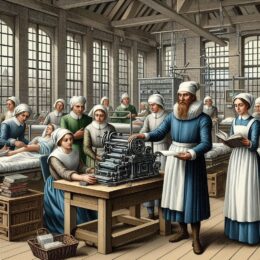 Amidst the backdrop of ever-increasing wait times and reduced access to healthcare, frontline healthcare workers report losing precious hours each week due to subpar printers.
Amidst the backdrop of ever-increasing wait times and reduced access to healthcare, frontline healthcare workers report losing precious hours each week due to subpar printers.
Epson has conducted a study of 200 patient-facing healthcare workers across the UK and discovered that 72 per cent concurred that their already overstretched teams are squandering time with inadequate technology, and an additional 76 per cent thought more should be done to address the problem.
Printers were identified as a significant time sink, with healthcare workers losing an average of 47 minutes a week to sluggish or inoperative printers — equating to nearly 3,980,955 workdays lost annually. Alarmingly, 18 per cent of workers are forfeiting one to two hours weekly, while six per cent are losing an astonishing three to four hours a week due to printer-related issues.
Despite the ongoing digitisation of the UK’s healthcare services and processes, there remains a substantial reliance on paper, making the availability of quick, operational printers crucial.
However, the research highlighted that slow or malfunctioning printers have caused delays or complications in updating patient records (34 per cent), scheduling appointments (29 per cent), discharging patients (19 per cent), and even in providing medication or treatment (15 per cent) to those in need.
A quarter of those surveyed (23 per cent) agreed that non-functional or sluggish printers resulted in patients spending less time with healthcare staff, and a further third (32 per cent) stated that poor printers lead to an increase in patient complaints.
While the research underscores the detrimental impact of substandard technology on the efficiency of healthcare services, 80 per cent of respondents acknowledged that despite the time lost to non-functional or slow printers, minimal action is being taken. Additionally, a third (36 per cent) also believe that funds are being squandered in their respective departments.
Epson UK, Head of Office Printing Nick Taylor said: “It’s a stark picture. Contrary to what many might assume, printers are not just peripheral to the job of a patient-facing healthcare worker; they are central. Poor technology adversely affects patients, and practitioners are clamouring for action.”
“A simple transition from laser printers to Heat-Free inkjets could be beneficial for many organisations. Heat-free inkjets typically have fewer moving and consumable parts to replace over the printer’s lifespan than lasers, thus reducing intervention and enhancing productivity and user satisfaction.”
Unlike laser printers, which rely on heat-intensive processes like fusing toner to a page, Epson’s Heat-Free Technology does not require heat in the ink ejection. Therefore, making the switch can boost efficiency and decrease energy consumption.
With 80 per cent of the healthcare workers in agreement that IT departments and managers should supply printers that print swiftly and demand less maintenance to alleviate difficulties and wasted time, it’s evident that a transformation is necessary.
Healthcare leaders—particularly IT managers—must heed the calls of patient-facing healthcare workers and contemplate change. By doing so, they will bolster patient outcomes.





